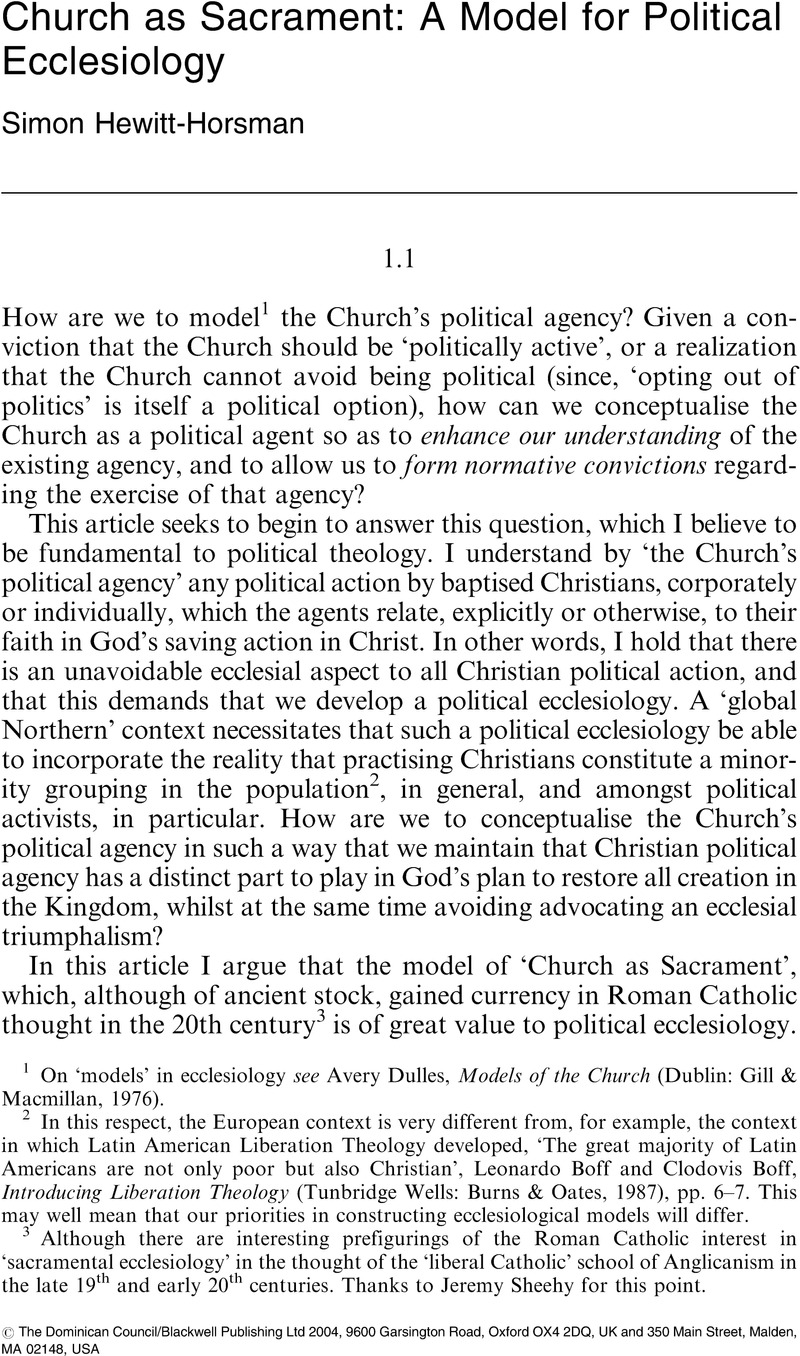Published online by Cambridge University Press: 01 January 2024

1 On ‘models’ in ecclesiology see Dulles, Avery, Models of the Church(Dublin: Gill & Macmillan, 1976)Google Scholar.
2 In this respect, the European context is very different from, for example, the context in which Latin American Liberation Theology developed, ‘The great majority of Latin Americans are not only poor but also Christian’, Boff, Leonardo and Boff, Clodovis, Introducing Liberation Theology(Tunbridge Wells: Burns & Oates, 1987), pp. 6–7Google Scholar. This may well mean that our priorities in constructing ecclesiological models will differ.
3 Although there are interesting prefigurings of the Roman Catholic interest in ‘sacramental ecclesiology’ in the thought of the ‘liberal Catholic’ school of Anglicanism in the late 19th and early 20th centuries. Thanks to Jeremy Sheehy for this point.
4 Kasper, Walter, Theology and Church(London: SCM Press, 1989) pp. 111–128Google Scholar.
5 Kasper op. cit. p. 111.
6 Dulles op. cit. p. 58. Both the ‘institutional’ and ‘communion’ models of church are described elsewhere in Dulles’ book.
7 Translated from Lubac, Henri de, Catholicisme(Paris: Cerf, 1983), p. 50Google Scholar.
8 Kasper op. cit. p. 114.
9 [LG]. The translation referred to for this, and all Vatican II documents, is that in Flannery, Austin (ed.)Vatican II: The Conciliar and Post-conciliar Documents, (Dublin: Dominican Publications, 1992)Google Scholar. I have, in all translations of Conciliar documents, altered the translation of Latin nouns referring to generic humanity, in order to render the language ‘inclusive’.
10 [LG 1: 1].
11 c.f. Dulles op. cit. pp. 31–42.
12 [GS: 42] in Flannery op. cit.
13 Rahner, Karl, The Church and the Sacraments(Tonbridge: Burns & Oates, 1986), p. 11Google Scholar.
14 Rahner op. cit. p. 19.
15 Rahner, Karl, Theological Investigations: Volume Two(London: Darton, Longman & Todd, 1963), p. 73Google Scholar.
16 [LG 7: 48]
17 [LG 2:9]
18 Schillebeeckx, Edward, Christ the Sacrament of the Encounter with God(Franklin: Sheed & Ward, 1999)Google Scholar. More precisely, for Schillebeeckx, the Church is the sacrament of the Risen Christ, who is the ‘primordial sacrament’ of the encounter with God.
19 Magana, Alvaro (1993), ‘Ecclesiology in the Theology of Liberation’ in Ellacuria, Ignacio and Sobrino, Jon (eds.), Mysterium Liberationis: Fundamental Concepts in Liberation Theology(New York: Orbis Books, 1993) pp. 194–209Google Scholar. Magana writes of the Church being a ‘sacrament of historical liberation’ and a ‘sign’ of the ‘Reign of God’; ‘sign’ here is used in a sense approximating to Rahner's ‘intrinsic sign’. See also Boff & Boff op. cit. p. 59.
20 Macquarrie, John, Principles of Christian Theology(London: SCM Press, 1977), p. 391Google Scholar.
21 Macquarrie, op. cit. p. 369.
22 Macquarrie, op. cit., p. 368.
23 Macquarrie, op. cit. p. 390.
24 Macquarrie, op. cit., p. 369.
25 I do not say ‘political’ reality because, strictly speaking the notion of the Kingdom in its fullness contains the determinate negation of politics, that is of social conflict and coercion. In this sense the Kingdom is utterly apolitical! Political theology protests against the premature ending of politics, in the light of the ultimate ending of politics in the Kingdom.
26 The Radical Orthodoxy school may be suspected of making such an equation on occasion, certainly in practice if not in explicit theory. See Simon Hewitt-Horsman, ‘The Kingdom in Milbank: A Critique’, Theology, Vol CVI, §832, pp. 259–267.
27 “Thy hand O God has guided”, Hymns Old and New Anglican Edition, 518, final verse.
28 Williams, Rowan, On Christian Theology(Oxford: Blackwell, 2000), p. 276–289Google Scholar.
29 [GS: 42]
30 Williams op. cit. p. 209.
31 Dulles op. cit. pp. 65–66.
32 Hence Rahner's notion of the ‘stratification’ of the Church, whereby the baptized are members of the Church as juridical organisation, and anonymous Christians belong to ‘Church as humanity consecrated by the Incarnation’, see Rahner (1963)op. cit. p. 86.
33 c.f. Schillebeeckx's notion of the ‘negative experience of contrast’ e.g. in Schillebeeckx, Edward, Church: The Human Story of God, trans. Bowden, John (London: SCM, 1990), p. 5Google Scholar.
34 By which we must understand the agency whereby human beings freely co-operate with God's grace, given in sovereign freedom. My comments on gender should not be read as pre-judging the debate on women's ordination in the universal Church, although the considerations noted here are clearly relevant to that dabate.
35 World Council of Churches, Baptism, Eucharist and Ministry(Geneva: WCC, 1982), 36Google Scholar c.f. Smyth, Frederick Hastings, Sacrifice: A Doctrinal Homily(New York: Vantage Press, 1953)Google Scholar
36 c.f. Smyth, Sacrifice.
37 Alternatively, perhaps we could say that all political activity undertaken by Christians has an ecclesial character, and that the fact that some of this political activity is not Kingdom-directed is testimony to the nature of the Church as being a corpus mixtum– a ‘mixed Body’ of sin and grace. Here I am arguing that certainly all authentic ecclesial activity is Kingdom-directed.
38 More precisely – we might say, by their co-operation with God's grace, whether or not this is recognized as such.
39 See McCabe, Herbert, God Still Matters(London, Continuum, 2002) pp. 90–91Google Scholar. A fascinating piece on the provisionality of sacraments, in this case the Eucharist, and the political significance of this is Eagleton, Terry, ‘Irony and the Eucharist’, New Blackfriars 83.981 (2002), pp. 513–516CrossRefGoogle Scholar.
40 Schillebeeckx, Edward, On Christian Faith: The Spiritual, Ethical and Political Dimensions(New York: Crossroad, 1987), p. 64Google Scholar.